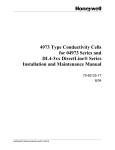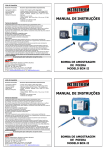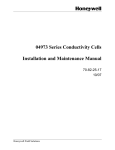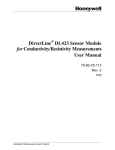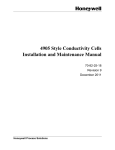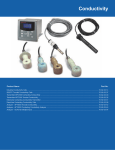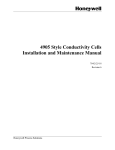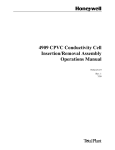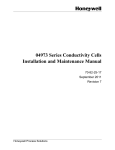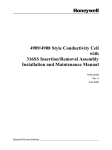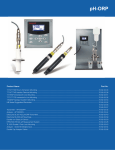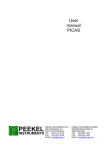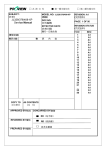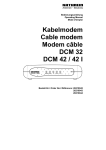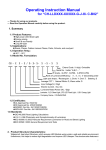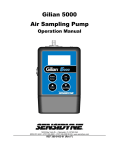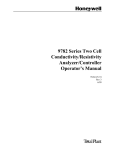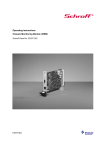Download 4905 Style Conductivity Cells for 04905 Series and DL4
Transcript
4905 Style Conductivity Cells for 04905 Series and DL4-5xx DirectLine® Series Installation and Maintenance Manual 70-82-25-18 Rev. 3 6/04 Copyright, Notices, and Trademarks Printed in U.S.A. – © Copyright 2004 by Honeywell Inc. Revision 3 – 6/04 While this information is presented in good faith and believed to be accurate, Honeywell disclaims the implied warranties of merchantability and fitness for a particular purpose and makes no express warranties except as may be stated in its written agreement with and for its customer. In no event is Honeywell liable to anyone for any indirect, special or consequential damages. The information and specifications in this document are subject to change without notice. Honeywell Industrial Measurement and Control 1100 Virginia Drive Fort Washington PA 19034 ii 4905 Series Conductivity Cells – Installation and Maintenance 6/04 About This Document Abstract This document is intended to support the installation, operation and maintenance of the 4905 Series of Conductivity Cells. Revision Notes The following list provides notes concerning all revisions of this document. Rev. ID Date Notes 0 12/96 This document is the initial Honeywell release of the L&N manual p/n 177667 Rev. M2. There has been no significant changes made to this manual. The format has been changed to reflect the Honeywell layout. 1 6/99 Edits done to add new Model Selection Guide information and to correct some errors in the text. 2 6/03 Removed obsolete info, added DL4000 details. References Honeywell Documents The following list identifies all Honeywell documents that may be sources of reference for the material discussed in this publication. Document Title ID # 9782 Series Conductivity/Resistivity Analyzer/Controller Operator’s Manual 70-82-25-74 APT2000CC Transmitter User Manual 70-82-25-95 APT4000CC Analyzer User Manual 70-82-25-104 DirectLine Module for Conductivity User Manual 70-82-25-112 Contacts The following list identifies important contacts within Honeywell. Organization Telephone Address Honeywell Tech support 1-800-423-9883 Voice 1100 Virginia Drive Fort Washington, PA 19034 6/04 4905 Series Conductivity Cells – Installation and Maintenance iii Contents 1. INTRODUCTION ................................................................................................... 1 1.1 2. SPECIFICATIONS AND MODEL SELECTION GUIDE ........................................ 3 2.1 Specifications ................................................................................................................................. 3 2.2 Model Selection Guides ................................................................................................................. 4 3. INSTALLATION .................................................................................................... 7 3.1 Overview ........................................................................................................................................ 7 3.2 Types of Mounting ......................................................................................................................... 7 3.3 Flow-Type Mounting ..................................................................................................................... 8 3.4 Immersion-Type Mounting for 04905 Series Cells........................................................................ 8 3.5 Insertion-Type Mounting ............................................................................................................... 9 3.6 Electrical Connections.................................................................................................................. 11 4. iv Overview ........................................................................................................................................ 1 MAINTENANCE .................................................................................................. 17 4.1 Introduction .................................................................................................................................. 17 4.2 To Clean The Cell ........................................................................................................................ 17 4.3 To Check Conductivity System.................................................................................................... 17 4.4 Replacement Parts and Accessories ............................................................................................. 18 4905 Series Conductivity Cells – Installation and Maintenance 6/04 Figures Figure 1-1 4905 Type Conductivity Cell Mounted in a 1-1/4” Schedule 80 Tee Using an Adapter Bushing ________________________________________________________________________ 1 Figure 3-1 Types of Mountings for 4905 Type Conductivity Cells ______________________________ 7 Figure 3-2 Typical Conductivity Measuring Installation ______________________________________ 8 Figure 3-3 Dimension Drawing for 276127 Flow Housing ___________________________________ 10 Figure 3-4 Mounting Dimensions for 04905 Series and DL4-5xx Series Cells ____________________ 11 Figure 3-5 Mounting Dimensions for 04905 Series with Junction Box Head (Not available on DL4-5XX DirectLine Cells) ________________________________________________________________ 11 Figure 3-6 4905 Series Cell with Junction Box Head Connected to 9782 Conductivity/Resistivity Analyzer_______________________________________________________________________ 12 Figure 3-7 04905 Series Cells with 7 or 20 Foot Leads Connected to 9782 Conductivity/Resistivity Analyzer or Connected to Junction Box ______________________________________________ 13 Figure 3-8 04905 series cells with 20’ leads connected to an APT4000 _________________________ 14 Figure 3-9 04905 series cells with or 20’ leads connected to an APT2000_______________________ 14 Figure 3-10 Integral DirectLine Mounting with DL4-5xx ____________________________________ 15 Figure 3-11 Remote DirectLine DL4-5xx series with 20’ lead connected to a DL423 Modbule (through the use of the Remote Connector Assembly)___________________________________________ 16 6/04 4905 Series Conductivity Cells – Installation and Maintenance v vi 4905 Series Conductivity Cells – Installation and Maintenance 6/04 Introduction 1. Introduction 1.1 Overview These cells form the sensing network for industrial analyzers and transmitters designed to make continuous measurements of electrolytic conductivity. The cells are primarily suited to measurements in effluents of ion-exchangers and distillation columns; but appropriate constants are provided for many other applications, including measurements in micro-electronic component washing and plating-rinse effluents. Universal in mounting, any of the cells can be arranged for immersion (except DL4000 Series), insertion (1” NPT) or flow type sampling. The latter can be achieved by use of a CPVC flow housing, a 1” pipe tee (schedule 40), or 1-1/4” plastic tee (schedule 80) installed in a process line or bypass line as pictured in Figure 1-1. Cell Assembly Adapter Bushing Schedule 80 1-1/4" Pipe Tee Guard Tube on Cell a/n 23381 Figure 1-1 4905 Type Conductivity Cell Mounted in a 1-1/4” Schedule 80 Tee Using an Adapter Bushing ATTENTION Please note that specific parameters of your process may prohibit the use of nickel elements. For example, use a platinum-element cell if the cell will measure or be exposed to regeneration acids or bases. 6/04 4905 Series Conductivity Cells – Installation and Maintenance 1 4905 Series Conductivity Cells Installation and Maintenance Manual The cell constant is selected according to the range of the measuring instrument used and the solution measured. In general, a high-constant cell is used for solutions having low electrical resistance (high conductivity) and a low-constant cell is used for solutions having high electrical resistance (low conductivity). The DL4-5xx Series of 4905 style cells used with the DirectLine Module (DL423 Series) can be specified for either integral or remote mounting of the module. The integral mount cell has a PC board connector so the DirectLine module mounts directly on the cell. Cells for remote mounting of the DirectLine module have a 20’ cable that is an integral part (potted) of the cell. Automatic Temperature Compensation (ATC) during the measurement is provided by a built-in temperature sensing network located near the cross-channel or guard-tube holes. The cells are molded from Polyethersulfone (PES) which is resistant to most corrosive chemicals over a wide range of temperatures. (A common exception is chlorinated hydrocarbons.) Sample solutions come into contact only with the above plastic and the platinum or nickel electrode surface. Any cell can be supplied with either electrode material. 2 4905 Series Conductivity Cells – Installation and Maintenance 6/04 Specifications and Model Selection Guide 2. Specifications and Model Selection Guide 2.1 Specifications Cell Constant - 04905 Series: 0.01, 0.1, 1.0, 10, and 50 as specified. DL4-5xx: 0.1, 10, 50 as specified Electrode Material - Nickel or platinum as specified. Maximum Pressure Limit - 250 psig (1724 kPa) @ 140°C (284°F). Maximum Continuous Temperature Limit - 140°C (284°F) Mounting Insertion- 1” NPT male, Schedule 40. Flow Chamber - Inlet - 3/4” NPT Male. Outlet: 3/4” NPT Female. Insertion Depth - 5” to 7” (127 to 178 mm) depending on cell constant. Overall Length - Approximately 6 to 8” (152 to 203 mm) or 10 to 12-1/4” (254 to 311 mm) if universal head is used. Materials of Construction (Wetted Parts) - Cell body: PES (Polyethersulfone). Electrodes: nickel or platinum. Leadwire- Tefzel-covered 18 gage cable, 0.177” (4.55 mm) OD at lengths listed. Weight - Approximately 1 lb (0.45 kg) or 3 lb (1.35 kg) if universal head is used. Specifications for 276127 Flow Chamber 6/04 Max. Flow - 2 gpm @ 40 psig and atmospheric discharge. Max. Pressure - 200 psig at 25°C. Max. Temperature - 140°C (284°F) at atmospheric pressure. Dimensions - 1-1/2” (3.8 cm) octagon x 8-3/4” (22.2 cm) long. Sample inlet: 3/4” NPT male. Sample outlet: 3/4” NPT female. Cell inlet: 1” NPT female. Material - Polyethersulfone (PES) 4905 Series Conductivity Cells – Installation and Maintenance 3 4905 Series Conductivity Cells Installation and Maintenance Manual 2.2 Model Selection Guides 4905 Series for use with 9782 Series or APT Series Instructions Consult Steps to Selecting Appropriate Conductivity Instrumentation and Cells before making selections below. (Section 2 INTRO) Select the desired key number. The arrow to the right marks the selection available. Make one selection from each Table using the colum below the proper arrow. A dot denotes unrestricted availability. Key Number _____ I - ___ II - __ III - ___ - IV __ V - ___ KEY NUMBER Description 04905 Conductivity Cell VI - ___ Selection 04905 TABLE I - CELL CONSTANT 0.01 0.1 1 10 50 001 X01 XX1 X10 X50 TABLE II - ELECTRODE MATERIAL (Note 1) Nickel (Note 1) Platinum 33 44 TABLE III - AUTOMATIC TEMPERATURE COMPENSATION For APT2000/4000CC, 9782C, or 7082 Only 333 TABLE IV - Leadwire Length 20 ft. (6,10 meters) Leadwire Leadwire Length Universal Head (Aluminum) 20 X1 TABLE V - Special Insertion Lengths None Special Insertion 4.4 in. (111,76 mm) extra Length 8.8 in. (223,52 mm) extra 4 Availability (Note 2) c 000 910 920 4905 Series Conductivity Cells – Installation and Maintenance 6/04 Specifications and Model Selection Guide TABLE VI - OPTIONS Tagging None Linen Stainless Steel 0_ _ L_ _ S_ _ No Certificate of Calibration Yes & Conformance _0_ _1_ _ _0 Future Note 1: Platinum is used in acid and base applications; Nickel is used in all others Note 2: If shorter length is required, cut to length, skin and tin ends. RESTRICTIONS Restriction Letter c Available Only With Table III Selection Not Available With Table Selection For 9782/7082 and APT2000/4000CC Analyzers Only DL4000 Series for use with DirectLine Sensor Modules Instructions Select the desired key number. The arrow to the right marks the selection available. Make the desired selections from Table I using the column below the proper arrow. A dot ( ) denotes availability. No ( ) dot denotes not available. II I III Key Number ____ ___ - ___ - ___ - Key Number - Mounting/Electrode Only (Specify DL423 separately) Selection Contacting Conductivity Probes/Mountings for use with DL423 DL4 TABLE I - Mounting Type, Construction, Cell Constant, DirectLine Connection Material of DirectLine Internal Cell/Mounting Type Construction Cell Constant Connection EEPROM Titanium 0.1 Integral High Purity In-line Graphite 10 Yes Titanium 0.1 (4973-style) 1 Remote Graphite 10 301 302 311 312 Not available for 4905 Style Conductivity Cells 6/04 4905 Series Conductivity Cells – Installation and Maintenance Availability 5 4905 Series Conductivity Cells Installation and Maintenance Manual TABLE I - Mounting Type, Construction, Cell Constant, DirectLine Connection (continued) Internal Material of Cell Construction DirectLine Note 2 EEPROM Selection Cell/Mounting Type Constant Connection 0.1 Nickel 501 0.1 Platinum 502 10 Nickel 503 Integral Yes 10 Platinum 504 50 Nickel 505 General Purpose 506 Platinum 50 (4905-style) 0.1 511 Nickel 512 Platinum 0.1 513 Nickel 10 1 Yes Remote 10 Platinum 514 50 Nickel 515 516 50 Platinum 0.1 Nickel 911 Stainless Steel 0.1 Platinum 912 Insertion/Removal 10 Nickel 913 1 Yes Remote 10 Platinum 914 Assembly With Cell Nickel 915 50 (4909-style) Platinum 916 50 811 Nickel 0.1 Stainless Steel 0.1 812 Platinum 10 Insertion/Removal 813 Nickel 1 Yes Remote 10 814 Platinum Replacement Cell 50 815 Nickel (4908-style) 50 816 Platinum Availability Not available for 4905 Style Conductivity Cells Not available for 4905 Style Conductivity Cells Notes: 1. Remote conductivity cells are supplied with a integral 6,1m (20 ft.) sensor cable which must be wired to the DL423 remote connector (supplied with DL423 Sensor Module). 2. Platinum is used in acid and base applications; Nickel in all others TABLE II - Special Cell Constructions Cell Type Special Construction ALL None Extra 4.4" of cell length 4905 316 SS Support Tube 4909/4908 000 440 316 TABLE III - Options Tagging Calibration Certificate 6 None Linen Customer I.D. Tag - 3 lines w/22 characters/line Stainless Steel Customer I.D. Tag -3 lines with 22 characters per line None Calibration certificate to be supplied w/shipment 00 _ _ LT _ _ SS _ _ _ _ 00 _ _ 10 4905 Series Conductivity Cells – Installation and Maintenance 6/04 Installation 3. Installation 3.1 Overview The conductivity cell is secured permanently to the 1” N.P.T. bushing which is used for all types of mountings. The three different types of mountings are illustrated in Figure 3-1. Although the physical appearance of the various cells is the same (except for length), the cell construction differs according to the constant. On the 10, 25 and 50 constant cells, the electrodes are short tubes located midway inside the two parallel tubular channels that run lengthwise through the cell, and are open to the sample at both ends of the cell. The channels are larger on the 25 constant cell and they are elliptical on the 5 and 10 constant cell. The 1, 0.1, and 0.01 constant cells have a removable cell guard which is screwed onto the cell body to protect the electrode surfaces. Electrodes are three disks on the 1 constant cell, parallel plates on the 0.1 constant cell, and wire wound on the cell body on the 0.01 constant cell. Cells must be used with the guard in place or the cell constant may differ from that specified. Most of the auxiliary parts which enable the user to achieve the various types of mounting are readily obtained from local suppliers. For an immersion mounting with 04905 Series cells, only the appropriate length of 1/2 inch pipe (e.g., CPCV) and if desired, a 1/2 inch end coupling is needed. For an in-line flow mounting, only a 1” schedule 40 tee is required. The basic cell can be converted to a flow cell for either bypass or in-line arrangements by use of the PES flow-cell housing (Honeywell Part 276127) shown in Figure 3-1 and Figure 3-3. However, the temperature and pressure specifications listed for this flow chamber under Specifications apply. ATTENTION The DL4-5xx Series DirectLine cells have a EEPROM device for automatic download of cell constant and cell calibration factor. During installation proper ESD protection is required so the memory device is not damaged. 3.2 Types of Mounting The three types of mounting; Flow, Immersion and Insertion, are illustrated in Figure 3-1. Mounting dimensions for each type of cell assembly are given in Figure 3-3, Figure 3-4, and Figure 3-5. Insertion Type Immersion Type (Pipe extension and coupling not supplied) Not available with DirectLine cells DL4-5XX series. Flow Type Using Plastic Flow Housing (Honeywell p/n 276127) a/n23382a Figure 3-1 Types of Mountings for 4905 Type Conductivity Cells 6/04 4905 Series Conductivity Cells – Installation and Maintenance 7 4905 Series Conductivity Cells Installation and Maintenance Manual 3.3 Flow-Type Mounting The cross-channel or guard-tube hole in the cell must always be covered by the solution and the solution level must be 1-1/2 inches above these holes. When mounting the cell in a pipe tee such as shown in Figure 3-2, have the solution enter the tee from below and exit to the side. As shown, the guard-tube hole is in line with the horizontal pipe run. However, if it is possible that the pipe line will not be full at all times, locate the hole just below the exit pipe to insure flooding of the cell under all conditions. As shown in Figure 3-2, always locate the cell on the pressure side, not the vacuum side of the pump. The flow-cellhousing, an accessory part having 3/4” male inlet and female outlet threads, can be used for an in-line measurement or in a bypass line as shown in Figure 3-2, depending upon the flow volume or pipe size. Adapter bushings are available to convert inlet and outlet fittings to 1/4” female threads. See Section 4.4 . The cell must be covered by the solution at all times. Therefore, make certain the lowest solution head is higher than the cell location. See that an air bubble does not prevent the cell from filling properly. Flow-cell housing can be used “in-line” only if a maximum flow of 2 gallons per minute can be tolerated. To avoid cracking the 276127 flow-cell housing, use Teflon tape on cell threads and tighten cell only enough to prevent leakage. To install, tighten the cell into a 1” schedule 40 pipe tee. If the flow-cell housing is used, assemble the cell and housing and install it in the process flow line or in a bypass line. Process Preferred Cell Locations Cooler 15" (381mm) Pump a/n 23383 Figure 3-2 Typical Conductivity Measuring Installation 3.4 Immersion-Type Mounting for 04905 Series Cells Does not apply to DL4-5xx Series Cells. The cell must be immersed to a level above the cross-channel or guard tube hole and must be immersed to 1-1/2 inches above this hole if an integral compensator is used. For most immersion applications, a 1/2” support pipe, preferably CPCV must be threaded into the cell bushing, using Teflon tape to seal the threads, thus permitting adequate immersion. Unless this pipe extension is used, do not immerse the top of the bushing. To insured that a representative sample is measured at all times, the solution must circulate through the channels. In quiescent solutions, provide sufficient agitation. To install the cell, determine the length of 1/2” pipe required to give the immersion needed to keep the cell completely immersed at all times. Up to six feet of pipe can be used for the standard cell having seven feet of cable. Remove the small bushing at the top of the cell, slide it off the cable, and replace it with the 1/2inch pipe. At the top of the pipe slide a pipe coupling and the small bushing back over the leadwire as shown in Fig. 3-1, or install a junction box to terminate the pipe. 8 4905 Series Conductivity Cells – Installation and Maintenance 6/04 Installation 3.5 Insertion-Type Mounting The cell can be inserted into a 1” N.P.T. threaded opening, but it is imperative that the tank or chamber be full under all process conditions. Make certain the liquid head is above the cell location. A vertical insertion (from above) or a horizontal insertion can be used. To install, simply tighten the cell into a 1” N.P.T. threaded opening (using a Teflon thread compound such as Teflon tape) so that the entire electrode is immersed in the measured solution. Allow at least 1/2-inch clearance beyond the end of the cell. In applications where vertical mounting is required, avoid a position with the cell channels pointed up, as this will permit solution to flow down into the open end of the cell and may result in clogging by solids settling in the cell channels. See Figure 3-2. 6/04 4905 Series Conductivity Cells – Installation and Maintenance 9 4905 Series Conductivity Cells Installation and Maintenance Manual Flow Out 1 1/2" (38mm) Octagon 1 1/2" (38mm) 3/4" NPT Flow Chamber 1 1/2" (38mm) Octagon 3/4" NPT Flow In IN CELL 1 1/2" (38mm) 8 3/4" (222mm) 13 1/4" (337mm) 1" Fitting Allow 7 3/4" (197mm) for removal of cell RED Temp. Comp. Cell Shunt Comp. RED Temp. Comp. WHITE WHITE BLACK Linear Micromho, Resistivity, or Concentration Ranges Series Comp. Cell WHITE BLACK Cell BLACK Non-Linear Micromho Ranges Without Temp. Compensation RED GREEN WHITE Cell BLACK Linear Ranges (Table III = 333) Cell Wiring NOTES: 1. Mount cell and flow chamber horizontally as shown above with flow exit "up to eliminate possible air gap around cell body. 2. If cell and flow chamber must be mounted vertically, attach a short length of tubing to flow exit as shown below and form a trap to ensure filling of flow chamber, especially at low flow. CELL 2" min. (51mm) IN a/n 23384 Figure 3-3 Dimension Drawing for 276127 Flow Housing 10 4905 Series Conductivity Cells – Installation and Maintenance 6/04 Installation "X" See Table 1.687" (42.8mm) Cell Constant X" Approx. 001 0.1 1 5 10 20 25 50 5.4" 5.4" 5.4" 4.5" mm 138 138 138 114 146 5.8" 6.0" 152 175 175 6.9" 6.9 1" NPT 0.940" (24mm) Dia Cell cable is approx. 0.250" (6.4 mm) O.D. max. with 3 or 4 conductors of #18 AWG wire. 1.5" (38mm) Octagon a/n23385 Figure 3-4 Mounting Dimensions for 04905 Series and DL4-5xx Series Cells "X" See Table Cell constant X" Approx. 001 5.4" 5.4" 0.1 1 5.4" 5 4.5" 10 5.8" 20 6.0" 25 6.9" 50 6.9" 5.5" (140mm) mm 138 138 138 114 146 152 175 175 Fou Point Terminal Four Board for lead wire connections. Each #6-32 screw terminal will accomodate one #12 or smaller small AWG wire 3" (76mm) 1" NPT 0.940" (24mm) Dia 1.5" (38mm) Octagon ¾”female NPT for user's flexible electrical conduit connection. For insertion or removal of cell, disconnect conduit connections. NOTE: For existing users with conduit, a ¾” x ½” adapter bushing will be required to use existing conduit. Figure 3-5 Mounting Dimensions for 04905 Series with Junction Box Head (Not available on DL4-5XX DirectLine Cells) 3.6 Electrical Connections The detailed terminal-board connections for the analyzer or transmitter are given in the appropriate directions furnished with the measuring instrument. See Figure 3-6 and Figure 3-7 for connections to the 9782 Analyzer. See Figure 3-8 and Figure 3-9 for connections to the APT Series. See Figure 3-10 and Figure 3-11 for connections to the DirectLine Modules. To avoid the possibility of ac pickup in the cell leads, separate them from all ac line-voltage wiring or run them in a separate grounded conduit. 6/04 4905 Series Conductivity Cells – Installation and Maintenance 11 4905 Series Conductivity Cells Installation and Maintenance Manual FivePoint Terminal Board. EachTerminal Will Accept #16GageMax. Wire SH G 1000 max. 1000ft. Temp. Comp. RED BB B GREEN DDD Cell G W K W A D DDD BB B C Note2 C WHITE CC BLACK AAA Internal Cell Assembly bly Configuration Note3 R R CCC AAA Viewof JunctionBoxHead withCapRemoved CoaxCable Shield K (Note5) #2Temp Compensator #1Temp Compensator Cell 2(Note5) Electrodes Cell 1 Electrodes Note1 Conductivity/Resistivity Analyzer GND Analyzer Input Connections NOTES: 1. For pure water samples in non-conductive (plastic, glass, etc.) piping, ground the black cell electrode lead near the cell. Alternatively, connect to the 7082 ground screw as shown dotted. Do not ground 10, 25, or 50 constant cells. 2. 9782C – S0 – xx – Exxxx – BD (Standard Range Only) Use 18 gage minimum coaxial cable type RG6/U connecting shield to terminal “SH” only. 3. 9782C – S0 – xx – EOOOO – BD For cable runs of up to 500 ft., use 18 gage minimum, three conductor cable For cable runs of 500 - 1000ft., use 16 gage minimum, three conductor cable 9782C – W0 – xx – EOOOO – BD [coax and shield (SH) not used] For cable runs of up to 500 ft., use 18 gage minimum, three conductor cable For cable runs of 500 - 1000ft., use 16 gage minimum, three conductor cable 4. Cell to analyzer cables are considered low level. Run separate from high level wiring. 5. If 2 cells are to be applied, the same wiring guidelines are applied to Cell 2 as are followed for Cell 1. Figure 3-6 4905 Series Cell with Junction Box Head Connected to 9782 Conductivity/Resistivity Analyzer 12 4905 Series Conductivity Cells – Installation and Maintenance 6/04 Installation Five Point Terminal Board. Each Terminal Will Accept #16 Gage Max. Wire SH G 20 ft. max. R G RED Temp. Comp. Red Green Black White GREEN WHITE Cell I - II - III IV 333 - X1 II III I 4973 4974 - 4908 4909 - W K W BLACK K Cell cable is approx. 0.250" (6.4mm) O.D. max. with 4 conductors of #18 AWG wire, 7 or 20 foot length. Cell Assembly Connections 4905 R V VI IV V III IV 333 - X1 V #1 Temp Compensator Cell 2 (Note 5) Electrodes Cell 1 Electrodes Note 1 Conductivity/Resistivity Analyzer Analyzer Input Connections Di re c t Ce l l to Ana l yze r Ins t al l a t i o n GND 333 - X1 I II - VI VII 20 ft. max. SH 1000 ft. max. G Note 3 Red Green Black White I - II - III IV 333 - X1 II III I 4973 4974 - 4908 4909 - R R G G K W Junction Box Cell Assembly Connections 4905 (Note 5) #2 Temp Compensator V VI R W Note 2 Coax Cable Shield K W K Ce l l t o Ana l yz e r T hro ugh J unc t i o n Bo x IV V III IV 333 - X1 V Note 3 (Note 5) #2 Temp Compensator #1 Temp Compensator (Note 5) Cell 2 Electrodes Cell 1 Electrodes Note 1 333 - X1 I II - VI VII Conductivity/Resistivity Analyzer GND Analyzer Input Connections NOTES: 1. For pure water samples in non-conductive (plastic, glass, etc.) piping, ground the black cell electrode lead near the cell. Alternatively, connect to the 7082 ground screw as shown dotted. Do not ground 10, 25, or 50 constant cells. 2. 9782C - S0 (only) Use 22 gage minimum coaxial cable type RG59/U connecting shield to terminal "SH" only. 3. 9782C - S0 For cable runs of up to 500 ft., use: 18 gage minimum, three conductor cable. For cbale runs of 500 - 1000 ft., use: 16 gage minimum, three conductor cable. 9782C - W0 [coax and shield (SH) not used] For cable runs of up to 500 ft., use: 18 gage minimum, four conductor cable. For cable runs of 500 - 1000 ft., use: 16 gage minimum, four conductor cable. 4. Cell to analyzer cables are considered low level. Run seperate from high level wiring. 5. If 2 Cells are to be applied, the same guidelines are applied to Cell 2 as wereused for Cell 1. a/n 23346 Figure 3-7 04905 Series Cells with 7 or 20 Foot Leads Connected to 9782 Conductivity/Resistivity Analyzer or Connected to Junction Box 6/04 4905 Series Conductivity Cells – Installation and Maintenance 13 4905 Series Conductivity Cells Installation and Maintenance Manual Figure 3-8 04905 series cells with 20’ leads connected to an APT4000 Figure 3-9 04905 series cells with or 20’ leads connected to an APT2000 14 4905 Series Conductivity Cells – Installation and Maintenance 6/04 Installation Electronics Module Locking Screw in Rear of Housing Cell Figure 3-10 Integral DirectLine Mounting with DL4-5xx 6/04 4905 Series Conductivity Cells – Installation and Maintenance 15 4905 Series Conductivity Cells Installation and Maintenance Manual Electronics Module Conductivity Cell Remote Connector 1 2 3 4 5 6 Black Protective Sleeve (do not remove) Red Black Green White Blue Brown 6 1 5 2 4 3 Cover Strain Relief Compression Cap Remote Wiring Cable Cell Remote Electronics Module for Conductivity Cells Figure 3-11 Remote DirectLine DL4-5xx series with 20’ lead connected to a DL423 Modbule (through the use of the Remote Connector Assembly) 16 4905 Series Conductivity Cells – Installation and Maintenance 6/04 Maintenance 4. Maintenance 4.1 Introduction If abnormal readings occur, this may indicate poor response because the cell is not filled with process solution. Check the cell installation. Note that a grayish dull surface on the cell plastic (normally glassy) can result from exposure to temperatures above 140°C. The only maintenance which may be required is occasional cleaning in certain applications. Cell constants 0.01, 0.1, and 1 cannot be used if solution resistance measures less than 1000 ohms unless the cell is platinized in accordance with Section 5. 4.2 To Clean The Cell The cell will require cleaning if sludge, slime, etc., accumulates in the flow channels. Since the materials of construction are chemically inert, chemical agents may be used and are recommended for cleaning the cells. The particular cleaning agent used must be selected according to the type of contamination to which the cell is exposed. CAUTION The cell housing is PES (Polyethersulfone). DO NOT clean with acetone, chloroform, toluene, benzene, or any other chlorinated hydrocarbon. In general, soap and hot water are effective and adequate. If necessary, a soft bristle brush of about 1/4” diameter may be used to clean out the tubular channels of the 10, 25, and 50 constant cells. Do not scratch the electrode surfaces. Be especially careful not to bend the electrode plates of the 0.1 constant cell. Rinse the cell thoroughly in tap water and then in distilled water if available. 4.3 To Check Conductivity System To check the conductivity system comprising conductivity cell, leadwire, and measuring instrument, the user may desire to make a measurement in a reference solution of known conductivity. Control the temperature only within limits consistent with the desired accuracy. The 25°C temperature value is suggested. The solutions may be prepared in the presence of air. The solution must fill the cell during measurement. For optimum accuracy in acid measurements above 5% concentration, use the “Calibration Trim” function available in the conductivity instrument. See the 9782, APT 2000/4000 or DirectLine Model DL423 manuals for details on the trim function. To check the constant of a cell, use a second cell having the same constant and compare the reading of one against the other. If the 04905 Series conductivity cell model number contains ‘333’, the normal resistance of the temperature sensor as measured across the red (B) and green (D) leads is 8550 ohms at 25°C. To check the electrode insullation, connect an ohmmeter across the black (A) and white (C) leads. With a dry and clean cell, the resistance should be greater than 50 megohms. 6/04 4905 Series Conductivity Cells – Installation and Maintenance 17 4905 Series Conductivity Cells Installation and Maintenance Manual 4.4 Replacement Parts and Accessories Description Part Number Cell Guard Tube (1, 0.1, and 0.01 constants only) 065632 Leadwire bushing for 04905 Series Cells 050366 Flow Cell Housing, PES 276127 1 1/4” to 1” Bushing to adapt cell to 1 1/4” Schedule 80 pipe tee, PVDC 276142 Cell Extension Leadwire Table III other than 333 Three conductor PVC 18 gage (105°C max, Belden 9493) 834059 Three conductor Tefzel 18 gage (140°C max) 834086 Junction Box 316260 9782 Standard Ranges Up to 500 ft. Three conductor, 18 gage cable (Belden 9494) 834059 Coax Cable (Belden 9259) – 22 AWG Coax Cable (Belden 9290) – 18 AWG 835024 ------ Up to 1000 ft. Four conductor (3 used), 16 gage cable (Belden 9494) 834055 Coax Cable (Belden 9259) – 22 AWG Coax Cable (Belden 9290) – 18 AWG 835024 ------ 9782 Wide Ranges Up to 500 ft. - Four conductor, 18 gage 834052 Up to 1000 ft. - Four conductor, 16 gage 834055 DirectLine DL423 Remote Connector 18 51500768-004 4905 Series Conductivity Cells – Installation and Maintenance 6/04 Industrial Measurement and Control Honeywell, Inc. 1100 Virginia Drive Fort Washington, Pennsylvania 19034 70-82-25-18 0604 Printed in USA www.honeywell.com/imc




























